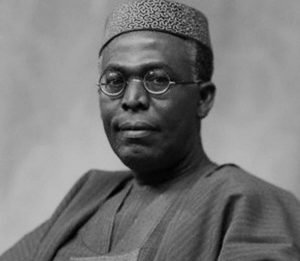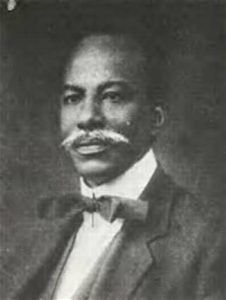Nigeria just clocked 60 years old and GoldenNewsNg presents to you the Full List Of Those Whose Labour Led To Nigeria Independence.
On this day, in 1960, Nigeria was conceived as it officially gained independence from the British colonial masters. A lot of things have changed in 60 years, especially regarding the political landscape. What can never be forgotten, however, is the labour of our heroes who made Nigeria’s independence possible.
Full List Of Those Whose Labour Led To Nigeria Independence
From Tafawa Balewa, Nigeria’s first prime minister, to Nnamdi Azikiwe, the country’s first elected president, these individuals made the fight for Nigeria’s independence their personal struggle. Like always, we remember them on this day.
AHMADU BELLO

Bello was the first and only premier of the northern region who ruled from 1954 to 1966. As the leader of the Northern Peoples Congress (NPC), he led the party to a majority victory in the pre-independence parliamentary elections of 1959. As Sardauna of Sokoto, he was a formidable force behind the throne and was considered one of the most powerful men in Nigeria.
The historical 1959 general election which effectively ushered in Nigeria’s independence in 1960, saw an alliance between the NPC under Bello forged an alliance with the National Council of Nigeria and the Cameroons (NCNC) under the leadership of Nnamdi Azikiwe, which resulted in Nigeria’s first indigenous federal government.
Bello chose to remain the premier of northern Nigeria and always preferred to be among his people in the north. His reign was cut short in January 1966 coup when he was assassinated by Chukwuma Nzeogwu in a coup which toppled Nigeria’s post-independence government.
NNAMDI AZIKIWE
Azikiwe was a leading figure of modern Nigerian nationalism who spent a better part of his life working to end British control of Nigeria, both as a journalist and a politician. Azikiwe served as the last governor-general of Nigeria from 1960 to 1963 as well as the country’s first elected president from 1963 to 1966 during the first republic. He had joined politics in 1944 and later co-founded the National Council of Nigeria and the Cameroons (NCNC) after a successful stint as a journalist, he became active in politics in 1944.
He inspired the Zikist movement, a radical revolutionary and multi-ethnic youth body which championed the Nigerian struggle against imperialism and the belief that Nigerians and indeed Africans should manage their own affairs.
As far back as the 1940s, Azikiwe had been championing for Nigeria’s independence from British rule and, in 1943, joined other West African editors to sign a memorandum raising awareness about political independence. They had also called for socio-political reforms that would include a repeal of the crown colony system, installing a representative system in regions and granting independence to West African colonies under the British rule.
An obituary in the 1996 issue of Jet captures his place in Nigeria’s and Africa’s history thus: “Known as a vigorous champion of African independence from European colonial rule, Dr. Azikiwe attained the rare status of national hero, admired across the regional and ethnic lines dividing his country.”
TAFAWA BALEWA
After the NPC won the pre-independence parliamentary election, Tafawa Balewa, being the vice-president of the party, emerged Nigeria’s first prime minister, a position he held till January 1966, when he was killed in the coup.
During his reign, Balewa was deeply involved in Nigeria’s policymaking process and developed a formidable reputation among Nigeria’s allies globally, especially from 1960 to 1961, when he doubled as the foreign affairs advocate of Nigeria.
He was also known to have also played important roles in the early years of indigenous rule in Africa, and was an important leader in the formation of the Organisation of African Unity (OAU). In the 1950s, he was actively involved in the campaign for indigenous rule and discussions on constitutional reform which ultimately led to independence in 1960.
OBAFEMI AWOLOWO
Obafemi Awolowo, who was the first premier of the western region from 1954 to 1960, was another nationalist who played active role in the struggle for Nigeria’s independence.
For some, he was Nigeria’s foremost federalist and advocated for federalism as the only basis for equitable national integration. While he led the Action Group (AG), Awolowo was on the forefront of the campaign for a federal constitution, which was introduced in the 1954 Lyttleton Constitution. As the leader of the opposition, he frequently challenged the policies of the Balewa-led government under the Northern People’s Party, often seen as aligning with the British colonial administration.
Awolowo was one of the country’s leading social democratic politician who, in his agitation for self-rule, was also known to have stood for economic and social development especially in the western region.
HERBERT MACAULAY
Tagged the father of Nigerian nationalism, Herbert Macaulay was one of the key figures who helped lay the foundation of modern Nigeria.
During the 1920s when Nigeria started to witness the political agitation for self-rule, Macaulay was among the first generation of Nigerian Nationalists who protested against some policies introduced by the British colonial rule, including water rates, land issues, and management of railway finances.
It was during that time, in 1923, that he founded the Nigerian National Democratic Party (NNDP), Nigeria’s first political party whose members were the first to sit in the legislative council and which held sway in Nigeria’s political theatre until the late 1930s when it joined forces with the Nigerian Youth Movement to form the National Council of Nigeria and the Cameroons (NCNC), a nationalist organization designed to advocate for Nigeria’s independence.
ANTHONY ENAHORO
Enahoro is reported to be the first politician to move the motion supporting Nigeria’s independence in the parliament in 1953, although it ended up an unsuccessful move. The early agitation for self-rule suffered setback and at one time, caused the northern members of parliament to stage a walkout out of the legislative chamber.
Notwithstanding his motion’s defeat, it contributed to a new movement in the parliament that sustained the pressure on the British colonial masters for Nigeria’s independence. It also saw the emergence of similar motions, including from Balewa and Remilekun Fani-Kayode, former deputy premier of the western region, all of which resulted in Nigeria’s independence in 1960.
As the chairman of the National Democratic Coalition (NADECO), a pro-democracy group, Enahoro challenged the dictatorship of Sani Abacha till the military leader died in 1998.
























